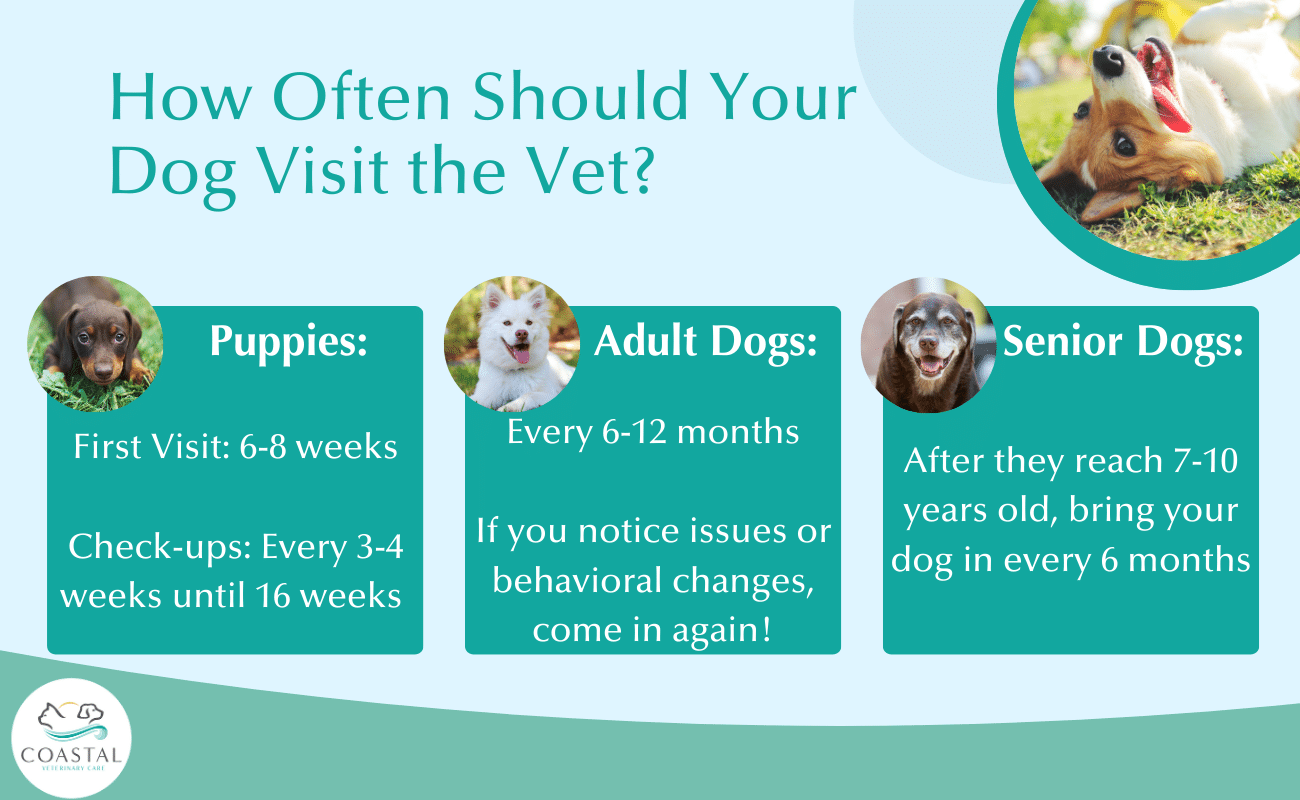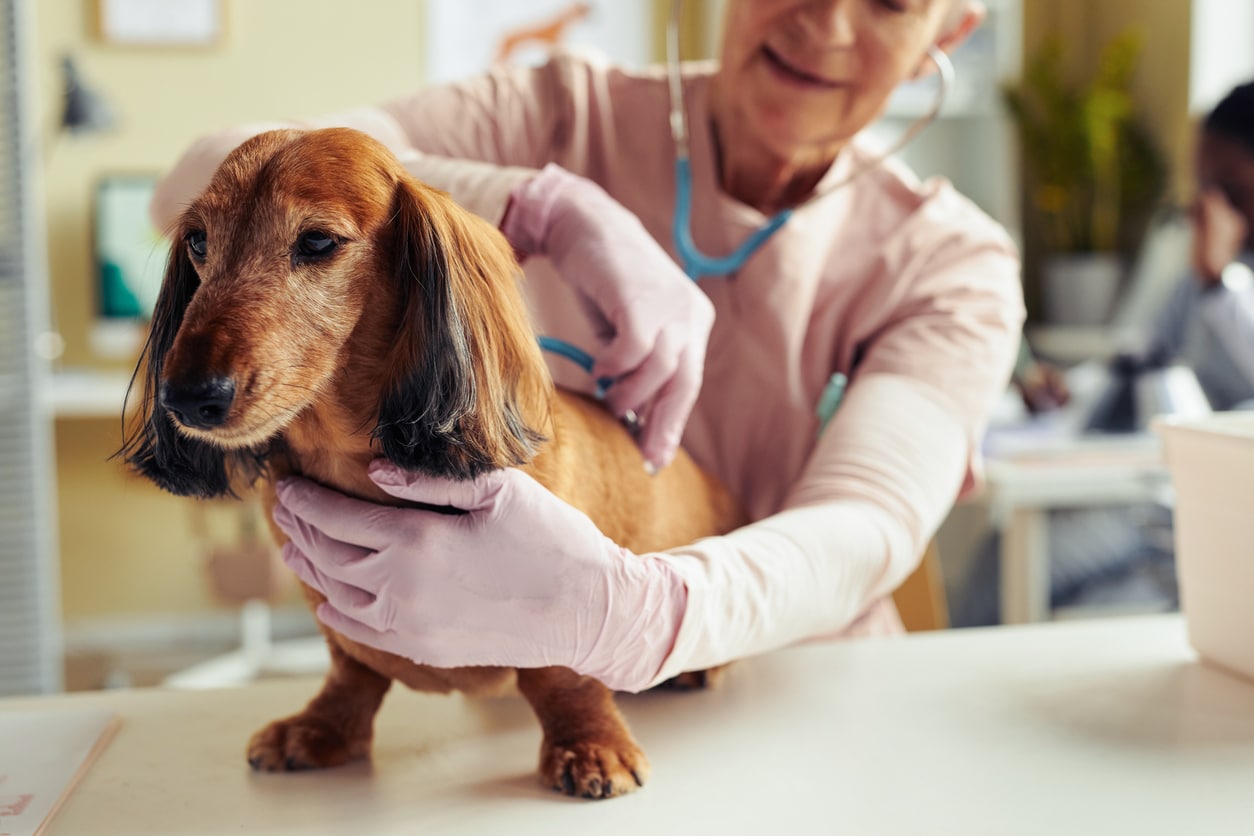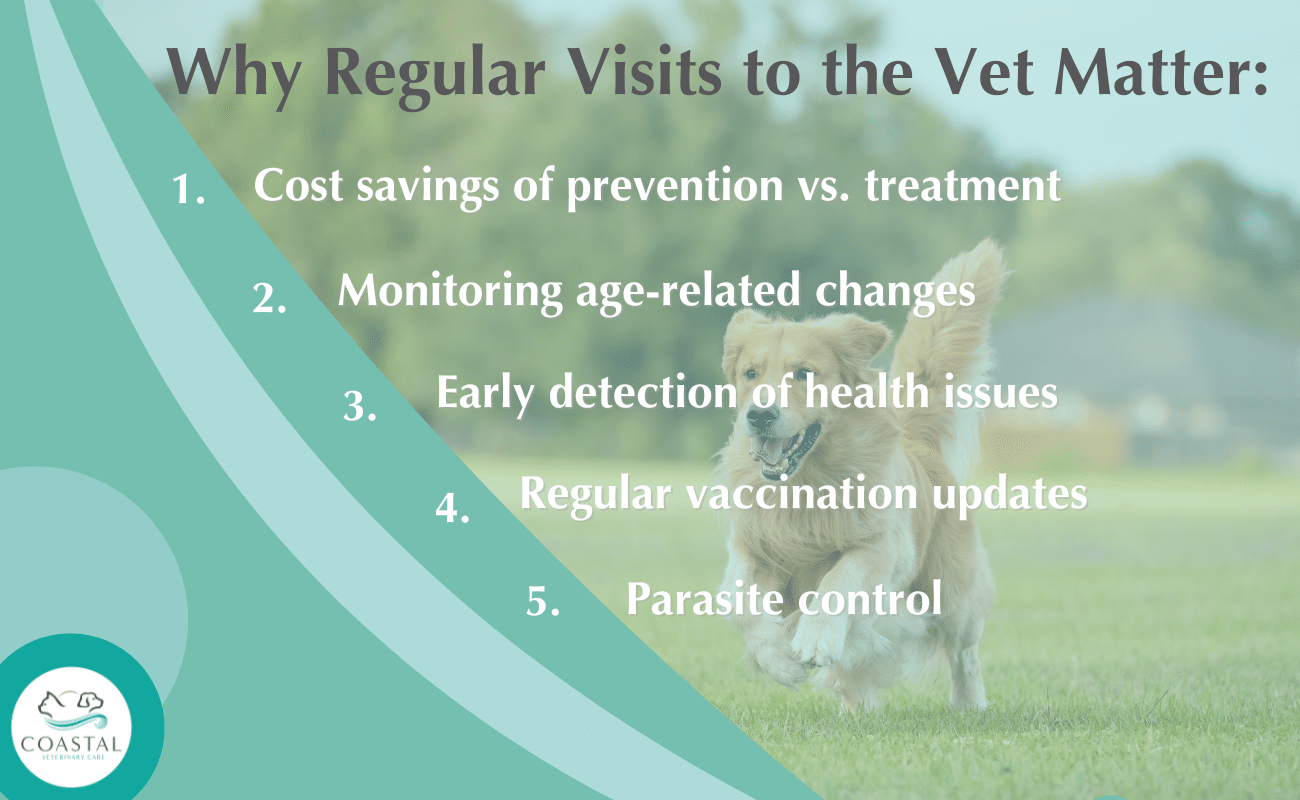How Often Should Dogs Go to the Vet? A Complete Guide to Veterinary Checkups
Regular vet visits are crucial for every dog’s health and happiness. Just as humans need regular check-ups, dogs require consistent veterinary care to ensure they stay healthy and active throughout their lives.
The Short Answer: Adult dogs should visit the vet every 6-12 months for routine wellness exams. However, this frequency varies depending on the dog’s age, health condition, and individual needs. Puppies need more frequent vet visits during their first year, while senior dogs benefit from wellness exams every six months to monitor age-related issues more closely.
This informative guide breaks down the recommended veterinary visit schedule for every stage of your dog’s life, from puppyhood to their senior years. You’ll learn what happens during these essential checkups, discover the specific health screenings recommended for different ages, and understand how proactive veterinary care can detect potential problems early – when they’re typically easier and less expensive to treat. Whether you’ve just welcomed a new puppy or have a beloved senior companion, this complete guide will help you provide the best possible healthcare for your canine family member.

Puppy Veterinary Schedule: Building a Healthy Foundation
Your new puppy’s first year of life requires careful medical attention to establish a strong foundation for lifelong health. During this crucial developmental period, regular vet visits are essential to monitor growth, administer vital vaccinations, and address any health concerns.
Puppy Vaccine Schedule
The first year vaccination schedule typically begins when your puppy is 6-8 weeks old. During these initial months, your furry friend should visit the veterinarian every 3-4 weeks until they reach 16 weeks of age. This consistent schedule ensures proper timing of core vaccines, which protect against common infectious diseases like parvovirus, distemper, and adenovirus. The rabies vaccine, a legal requirement, is typically administered between 12-16 weeks of age.
What Happens in a Puppy Exam
During your puppy’s early routine checkups, your vet will focus on key aspects of their health, setting the foundation for a lifetime of well-being. Here’s what you can expect:
- Parasite Protection Programs: Your vet will implement appropriate parasite control, including regular deworming treatments and starting your puppy on preventatives for heartworms, fleas, and ticks.
- Growth and Development Monitoring: Regular checkups will ensure your puppy is meeting growth milestones and maintaining a healthy weight.
- Spaying/Neutering: This procedure is typically recommended between 4-6 months of age, depending on breed and size. Your vet will advise on the best timing based on your puppy’s individual development.
- Positive Vet Experience: Frequent vet visits help your puppy build trust and comfort with handling, exams, and medical procedures. This sets the stage for stress-free veterinary visits throughout their life.
Investing in your puppy’s healthcare during their first year not only ensures their physical wellness but also helps establish a strong, positive relationship with veterinary care. Your vet will be your partner in monitoring growth, addressing any health concerns, and providing necessary preventive care.
Keeping Your Adult Dog Healthy

For adult dogs, maintaining a consistent wellness exam schedule is essential for their long-term health and well-being. The standard recommendation is to schedule regular vet visits at least once yearly, as dogs age much faster than humans, skipping just one annual check-up would be like a person avoiding the doctor for several years.
Routine Vet Checkups
During these routine checkups, your veterinarian performs a comprehensive physical exam from nose to tail. They will:
- Monitor vital signs (heart rate, blood pressure)
- Check your dog’s overall health condition and body status
- Conduct dental evaluations to identify issues like disease or plaque buildup
- Examine your pet’s skin for abnormalities
- Check ears for infections
- Assess mobility and joint health
Wellness Visits
Wellness visits for your dog typically include important diagnostic tests tailored to their age, breed, and health condition. Here’s what you can expect:
- Diagnostic Screenings: Blood tests to check for conditions like kidney disease, anemia, or organ dysfunction, and fecal tests to detect intestinal parasites.
- Vaccination Updates: Your veterinarian will review and update any necessary booster shots to keep your dog’s immunity strong against common infectious diseases
Care Recommendations:
Your veterinarian will craft recommendations specifically tailored to your dog’s breed, age, lifestyle, and health history. This personalized approach ensures your pet receives exactly the preventive care they need rather than generic advice. This advice may include:
- Nutrition & Weight Management: Guidance on the best diet and weight management plan based on your dog’s specific lifestyle and health status.
- Exercise Needs: Personalized recommendations to keep your dog active and healthy.
- Behavioral Advice: Addressing any behavioral concerns your dog may have and offering solutions.
- Dental Care & Parasite Prevention: Tips on maintaining oral hygiene and preventing parasites.
- Early Health Problem Detection: Regular checkups allow for early identification of health issues, making treatments more effective and often less costly in the long run.
By maintaining regular wellness visits, you can ensure that your dog receives the care and attention needed to stay healthy, happy, and active throughout their life.
Senior Dog Veterinary Care: Special Considerations

As our furry friends enter their golden years, typically around age 7-10 depending on breed size, their veterinary care needs become more specialized and frequent. Senior dogs require more vigilant vet visits to ensure they maintain a high quality of life throughout their later years. For older dogs, we recommend increasing wellness exams to twice yearly rather than the annual check-up sufficient for adult dogs. These regular vet visits are crucial because health conditions can develop rapidly in senior pets, and early detection often leads to better outcomes.
Managing Health Conditions with Preventive Care
During these visits, veterinarians conduct comprehensive physical exams specifically designed for aging dogs.
- Blood tests become particularly important as they can reveal early signs of kidney disease, diabetes, or other age-related issues before visible symptoms appear.
- We carefully monitor joint pain through examinations and sometimes diagnostic tests, as arthritis and mobility issues commonly affect senior pets.
- Cancer screening becomes a priority through physical exams and testing, as older dogs are more susceptible to various health problems.
Managing health conditions requires a proactive approach. Veterinarians work closely with pet parents to develop tailored treatment plans that may include:
- Medication
- Dietary adjustments
- Lifestyle modifications.
In order to keep senior dogs comfortable and active, special attention is paid to these factors:
- Weight management
- Dental care
- Pain control
Regular quality of life assessments help us ensure your canine companion remains comfortable and happy. These evaluations consider factors like mobility, pain levels, appetite, and engagement in daily activities. Through careful monitoring and appropriate interventions, we can help maintain your dog’s health and address any challenges that arise with aging.

Partner with Coastal Vet for Your Dog’s Health
At Coastal Vet, we recognize that your canine companion is a beloved member of your family. That’s why our fear-free certified staff is dedicated to ensuring every routine checkup is a calm and comfortable experience for your pet. We take pride in our modern, welcoming facility, equipped with state-of-the-art diagnostic tools and treatment options. Our comprehensive wellness services include:
- Preventive Care: Routine checkups and screenings to maintain your pet’s health and detect potential issues early.
- Dental Care: Professional dental services to keep your dog’s teeth and gums healthy.
- Digital Cytology: Advanced diagnostic testing for accurate, on-the-spot results to help identify infections or other health concerns.
- End of Life Care: Compassionate support and care for pets and their families during their final stages, focusing on comfort and dignity.
At Coastal Vet, we are committed to providing the highest standard of care for your furry family member. Don’t wait until your dog shows signs of health problems to schedule a vet visit. Whether you’re new to the Myrtle Beach area or looking for a more compassionate veterinary care experience, we invite you to join our family of caring pet owners. Taking the first step is easy, simply contact us to schedule your dog’s next annual check-up. Our friendly team will help you determine the right appointment frequency based on your pet’s age, health status, and individual needs.
Choose Coastal Veterinary Care in Myrtle Beach, SC
At Coastal Veterinary Care, we can help you determine an appropriate veterinary schedule that best supports your pet’s needs. From planning regular routine visits to understanding what to look for to identify when your pet may need to be seen to evaluate a specific injury or illness, we are here to help you make sure your pet gets the best possible care. Contact us today to learn more about why we are a trusted choice among pet owners in the Myrtle Beach, SC, area or to schedule an appointment!
